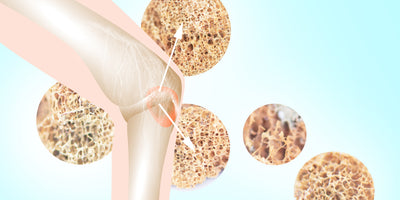
Maximising Nutrient Absorption: The Role of Prebiotics in Optimising Digestive Health
Introduction
Digestive health serves as the cornerstone of overall well-being, profoundly influencing everything from how effectively we absorb essential nutrients to the robustness of our immune systems. Amidst a variety of health supplements, prebiotics have garnered significant attention due to their unique ability to enhance the gut microbiome. Unlike probiotics, which introduce beneficial bacteria into the gut, prebiotics are non-digestible fibres that act as nourishment for the beneficial bacteria already present. This relationship is pivotal for not only enhancing nutrient absorption but also for strengthening the body's immune response and supporting various other aspects of digestive health. This comprehensive exploration will delve into the benefits of prebiotics, their role in dietary nutrition, and their broader implications for health and disease management.
Understanding Prebiotics: Definition and Health Benefits
Prebiotics are a type of dietary fibre which the human body cannot digest. Found in various fruits, vegetables, and whole grains, they serve as a food source for the beneficial bacteria in our gut. These fibres traverse the upper part of the gastrointestinal tract undigested and undergo fermentation when they reach the large colon, stimulating the growth and activity of beneficial bacteria. This process not only helps in maintaining a healthy intestinal environment but also plays a critical role in enhancing overall health.
The advantages of incorporating prebiotics into one's diet are manifold. Primarily, they boost the gut microbiome's capability to not only flourish but also to improve the mucosal barrier, which protects against pathogens. Enhanced gut health translates into better digestion, improved nutrient absorption, and a reduced risk of gastroenteritis. Furthermore, a robust gut microbiome can mitigate inflammation and has been linked to improved mood regulation due to the gut-brain axis connection, illustrating the extensive benefits of prebiotics beyond just digestive health.
The Science of Prebiotics and Nutrient Absorption

Prebiotics improve the body's ability to absorb essential nutrients, such as calcium and magnesium, which are crucial for bone health and overall cellular functions. By enhancing the intestinal environment, prebiotics facilitate more efficient nutrient uptake, which can be particularly beneficial for individuals with chronic digestive issues or those at risk of mineral deficiencies. Scientific studies have shown that a diet rich in prebiotics can significantly increase the absorption rates of these minerals, leading to improved bone density and overall health.
Moreover, the mechanism by which prebiotics enhance nutrient absorption involves the modulation of the pH in the gut. Lower pH levels increase the solubility of minerals, thereby enhancing their availability for absorption in the intestine. This not only supports skeletal health but also plays an essential role in maintaining a balance of electrolytes and other vital nutrients. The systemic benefits of improved nutrient uptake include better energy levels, enhanced immune function, and a reduced risk of chronic diseases such as osteoporosis.
Prebiotics vs. Probiotics: Complementary Roles in Gut Health
While prebiotics and probiotics are often mentioned together, they play distinctly complementary roles within the digestive system. Probiotics are live microorganisms that add to the population of good bacteria in the digestive tract. Prebiotics, on the other hand, act as food for these bacteria and help to foster an environment in which probiotics can flourish. This synergistic relationship enhances gut health and provides a robust defence against pathogenic bacteria.
The interplay between prebiotics and probiotics is crucial for maintaining an intestinal balance, often referred to as the gut flora. A healthy gut flora not only aids in digestion and absorption but also in the synthesis of vital vitamins like B and K. This synergy is especially important in conditions like antibiotic-associated diarrhea, where probiotic bacteria can help restore gut balance, while prebiotics ensure that these beneficial bacteria are well-nourished.
Optimising Gut Health: The Impact of Prebiotics on the Microbiome
Prebiotics have a profound impact on the gut microbiome, significantly influencing both its composition and functionality. By stimulating the growth of beneficial bacteria such as Bifidobacteria and Lactobacilli, prebiotics help to enhance the gut's overall health and its ability to fend off harmful pathogens. A well-balanced microbiome is not only essential for good digestive health but also for the proper functioning of the immune system and the prevention of infections.
The relationship between prebiotics and the microbiome is also pivotal in the prevention of gastrointestinal disorders, such as colorectal cancer and inflammatory bowel disease (IBD). Research indicates that a diet high in prebiotics can reduce the incidence of polyps and cancerous lesions in the colon by promoting a healthier bacterial environment. Additionally, prebiotics can alleviate the symptoms of IBD by reducing gut inflammation and enhancing the mucosal barrier function, further underscoring their value in digestive health management.
Dietary Sources of Prebiotics: What to Eat for Better Health
Incorporating prebiotics into your diet is straightforward, given their wide availability in common foods. Rich sources of prebiotics include chicory root, garlic, onions, leeks, asparagus, bananas, barley, and oats. These foods contain high amounts of inulin and other prebiotic fibres, which can help boost gut health. Adding them to your diet can be as simple as including garlic and onions in your cooking, snacking on bananas, or using whole grains like barley in soups and stews.
To maximise the benefits of prebiotics, it is advisable to gradually increase fibre intake to allow the gut microbiome to adjust without discomfort. Additionally, combining prebiotics with probiotic-rich foods like yogurt, kefir, or sauerkraut can enhance their effectiveness, promoting an even healthier gut microbiome. This holistic approach to diet can help ensure that your digestive system remains robust and efficient at nutrient absorption.
Addressing Digestive Disorders: How Prebiotics Can Help
Prebiotics play a significant role in managing and preventing various digestive disorders, including conditions like irritable bowel syndrome (IBS), Crohn's disease, and ulcerative colitis. These fibres help to modulate the gut microbiota, a key factor in the pathophysiology of these diseases. By enhancing the growth of beneficial bacteria, prebiotics can help restore the balance of gut flora, which is often disrupted in digestive ailments, thereby reducing symptoms like bloating, constipation, and diarrhea.
In the case of IBS, for example, patients often suffer from an imbalanced microbial population that contributes to symptom severity. Regular intake of prebiotics can promote a healthier bacterial balance, which helps to mitigate these symptoms and improve quality of life. Furthermore, the fermentation of prebiotics produces short-chain fatty acids (SCFAs) like butyrate, which has anti-inflammatory properties that are beneficial in reducing gut inflammation commonly seen in conditions like Crohn’s disease and ulcerative colitis.
The Link Between Prebiotics, Obesity, and Metabolic Health
Emerging research suggests a compelling link between the intake of prebiotics and improvements in metabolic health, including obesity management. Prebiotics can influence several metabolic processes, such as enhancing satiety, reducing appetite, and improving glucose and lipid metabolism. These effects are mediated through the production of SCFAs, particularly propionate and butyrate, which are known to play roles in satiety regulation and fat storage.
Studies have shown that prebiotics can help reduce body weight and waist circumference by improving gut health and reducing the absorption of certain fats. This process also helps to stabilise blood sugar levels, which can prevent the spikes and crashes that lead to cravings and overeating. Moreover, the improvement in lipid metabolism can lead to lower cholesterol levels, contributing to overall cardiovascular health. These benefits show that prebiotics may be a useful adjunct in the dietary management of obesity and metabolic syndrome, offering a natural approach to combating these global health issues.
Prebiotics in Clinical Nutrition: Therapeutic Applications
The utilisation of prebiotics extends beyond general dietary advice and into specific clinical nutrition practices. In healthcare settings, prebiotics are increasingly recognised for their therapeutic potential in patient recovery and disease management. For instance, in patients undergoing chemotherapy, prebiotics have been shown to help maintain a healthier gut microbiome, which can be severely disrupted by cancer treatments. This maintenance not only helps reduce the incidence of treatment-related gastrointestinal complications but also enhances overall patient resilience against infections.
Moreover, prebiotics are used in the management of diabetes by helping to stabilise blood glucose levels and decrease insulin resistance. The mechanism involves the modulation of gut hormones and the inflammatory response, which are crucial for metabolic control. This therapeutic use of prebiotics highlights their potential not just as a preventive health measure but also as a component of integrated disease management strategies, particularly in chronic conditions that are influenced by gut health.
Age-Related Digestive Issues and the Role of Prebiotics
As the body ages, the digestive system often becomes less efficient at processing food and absorbing nutrients, a factor that can contribute to increased health complications in elderly populations. The decline in digestive function is partly due to changes in the gut microbiome as well as the physical structures of the gastrointestinal tract. Prebiotics can help mitigate these effects by enhancing the growth of beneficial gut bacteria, which become increasingly important in older age for maintaining gut integrity and function.
Additionally, the fermentation of prebiotics by gut bacteria produces SCFAs, which have been shown to improve the health of colon cells, enhance mineral absorption, and prevent constipation, a common problem in older adults. By improving gut health, prebiotics can not only help enhance the quality of life for the elderly but also reduce their risk of developing gastrointestinal diseases and other health issues related to poor nutrient absorption.
Future Directions: Emerging Research on Prebiotics and Gut Health
The field of prebiotic research is continually evolving, with new studies illuminating the vast potential of these dietary fibres in health and disease. Future research is poised to explore innovative applications for prebiotics, including their use in mental health treatment due to their influence on the gut-brain axis. Preliminary studies suggest that prebiotics may help alleviate symptoms of depression and anxiety by modulating gut bacteria and their metabolites, which can impact brain function.
Moreover, the exploration of personalised nutrition, where prebiotic intake is tailored based on individual gut microbiota profiles, is another exciting frontier. This approach could optimise the health benefits of prebiotics for individual needs, potentially revolutionising how we think about diet and disease prevention. The continued research and application of prebiotics hold promise for not only enhancing digestive health but also for contributing to the broader spectrum of preventive medicine.
Summary
Definition and Role of Prebiotics:
- Prebiotics are non-digestible fibres that nourish beneficial gut bacteria.
- They enhance digestive health by improving the gut microbiome, which in turn boosts nutrient absorption and immune function.
- Prebiotics and probiotics serve complementary roles in gut health: prebiotics feed beneficial bacteria, while probiotics add to them.
- This synergy helps maintain a balanced gut flora, essential for optimal digestive health and nutrient absorption.
- Prebiotics enhance the absorption of minerals like calcium and magnesium by modifying the gut pH, making these nutrients more available.
- This is crucial for preventing diseases like osteoporosis and enhancing overall mineral uptake.
- Common sources include chicory root, garlic, onions, bananas, and whole grains.
- Incorporating these foods into one’s diet can significantly improve gut health.
- Prebiotics can alleviate symptoms of IBS, Crohn's disease, and other digestive disorders by reducing inflammation and balancing gut bacteria.
- They are beneficial in managing these conditions due to their ability to foster a healthier gut environment.
- Regular intake of prebiotics may aid in weight management and improve metabolic functions by enhancing satiety and reducing fat absorption.
- They have shown potential in lowering risks associated with obesity and metabolic syndrome, including diabetes and high cholesterol.
- Prebiotics are used in clinical settings to improve outcomes for patients with conditions affected by gut health, such as chemotherapy-induced complications and diabetes.
- They help counteract the natural decline in digestive efficiency and nutrient absorption seen in aging, reducing constipation and improving colon health.
- Ongoing studies are exploring the effects of prebiotics on mental health and developing personalised nutrition plans based on individual gut microbiota.
Prebiotic Information
For everything you need to know about prebiotics and prebiotic supplements, check out our comprehensive information page here.
Prebiotic
Biosphere Nutrition’s Prebiotic Powder is a unique blend of Sunfiber® and Black Elderberry Extract, designed to nurture gut health and support the immune system. This easy-to-mix, great-tasting formula ensures optimal absorption and digestive comfort. To learn more about our Prebiotic, check out the product page here.







